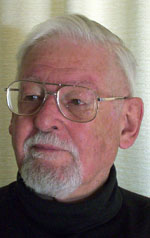| Home about PCT Presentation Order | |
|
|
About William T. (Bill) PowersAugust 29, 1026 - May 24, 2013 Bill provided this autobiographical sketch in July, 2006: I was in the Navy from age 17 to 19 (1944 to 1946), which is where I learned electronics, had my first experiences with repairing and maintaining various kinds of servomechanisms, and learned some basic feedback theory. I went into college in 1947 and graduated from Northwestern U. in 1950 with a BS in physics and mathematics. Then in 1952 after bumming around for a while in dianetics and working in a television manufacturing company, I went to work as a junior health physicist at the Argonne Cancer Research Hospital at the U of Chicago, where I learned some more about control systems. That's where I was when Bob Clark (whom I had known from dianetics and who was working with me on a feedback model of behavior) had an offer to start a new health physics department at the VA Research Hospital in Chicago, and in 1953 managed to get me a position there developing electronic systems for medicine, with half of my time supposedly free to work with control models of behavior. Bob MacFarland was chief clinical psychologist there. That's where I learned about analog computing (Philbrick) and had my first experiences programming a digital computer (IBM 650). I designed an automatic underwater isodose tracing system for a rotating Cobalt-60 therapy machine, using an analog computer as the control system. The late John Chancellor of NBC interviewed me about it. In 1960 I was first author of the paper in Perceptual and Motor Skills on "feedback theory" with Clark and MacFarland, and we split up when MacFarland advised me I had done about all I could and should turn the control theory project over to people with PhDs, meaning him and Clark. I said goodbye and decided to try to get my own PhD. I knew Donald Campbell by then, and through him got a scholarship to enter graduate school in psychology in 1960 at Northwestern, where he taught. But I left after one year because my proposed Masters Degree thesis, involving control by rats, was not acceptable to the Spencian psychologists then in charge. Note that this was 10 years after I got my BS. After I left the graduate school I went to work at Dearborn Observatory at Northwestern (I had worked there in my undergraduate years to supplement the GI Bill). While there I designed and built low-light-level television systems for astronomy, and designed and built a semi-automated observatory in New Mexico, used for successful supernova searches and other things. I also designed and built an all-sky survey photometer for use on the Moon in connection with Apollo 18, which was canceled (17 was the last one). And in my spare time, I worked on the manuscript which became B:CP 12 years later. Don Campbell, by the way, was instrumental in getting Aldine to publish it. He understood exactly why I had left the graduate school, and said I had done the right thing. When B:CP [Behavior: The Control of Perception] came out in 1973 I resigned from the observatory (astronomy was then in a period of decline with the end of the Apollo era) and sought to make money by consulting (and producing a board game, Trippples, which you can Google). After five years of giving seminars and publishing papers on feedback theory and using up Mary's and my savings, I took a job at the Chicago Sun Times working as a technician on their editorial computer system. I got the Marshall Field Award for developing a microcomputer system for receiving the stock market tables by satellite and automatically formatting them and sending them to the phototypesetter. We had stock tables on the streets three hours before any other newspaper in Chicago had them, including the Tribune, our arch-rival (hence the award). I worked there from 1978 until I retired in 1990. The CSG [Control Systems Group] was formed in 1985, so my two lives overlapped there, too. A pdf that includes this and information on Powers' publications, click here. For more personal information about William T. Powers, see Festschrift |
| © 2004–2024 Living Control Systems Publishing |
|

